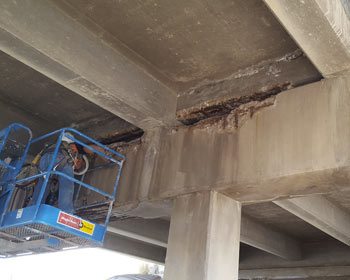Research Reports
Report Details
Abstract
 The current legally required two-year inspection interval for most bridges is not an efficient system for conducting inspections, because many bridges do not require inspections this frequently, while others would benefit from more frequent monitoring. The research presented herein is based on the premise that, fundamentally, inspections are conducted to update information about the current condition of structures to provide information for decision making. Thus, inspections should only be conducted when there is a reasonable expectation that the information gathered from the inspection will provide a greater level of certainty about bridge conditions that will facilitate more appropriate decisions. From this premise, this report proposes an uncertainty-based approach to planning inspection timing and determining inspection type based on limited resources. The report includes an example demonstrating how such an approach could be implemented for RC bridge decks. Based on existing deterioration models, a program called the Concrete Deck Cracking Probability Model (CDCPM) is written in MATLAB to model the uncertainty in the occurrence of transverse cracking and delamination in the deck. The effect of different climates and mechanistic models on the prediction of cracking is explored using CDCPM. This model is applied to a bridge in Larimer County, Colorado, to see how the results compare with actual inspection results, and the model is used to plan a future delamination inspection on the bridge.
The current legally required two-year inspection interval for most bridges is not an efficient system for conducting inspections, because many bridges do not require inspections this frequently, while others would benefit from more frequent monitoring. The research presented herein is based on the premise that, fundamentally, inspections are conducted to update information about the current condition of structures to provide information for decision making. Thus, inspections should only be conducted when there is a reasonable expectation that the information gathered from the inspection will provide a greater level of certainty about bridge conditions that will facilitate more appropriate decisions. From this premise, this report proposes an uncertainty-based approach to planning inspection timing and determining inspection type based on limited resources. The report includes an example demonstrating how such an approach could be implemented for RC bridge decks. Based on existing deterioration models, a program called the Concrete Deck Cracking Probability Model (CDCPM) is written in MATLAB to model the uncertainty in the occurrence of transverse cracking and delamination in the deck. The effect of different climates and mechanistic models on the prediction of cracking is explored using CDCPM. This model is applied to a bridge in Larimer County, Colorado, to see how the results compare with actual inspection results, and the model is used to plan a future delamination inspection on the bridge.
CDCPM revealed that the uncertainty in the current bridge condition is heavily influenced by the mechanistic models chosen for the analysis, as well as some of the parameters used in the models. The surface chloride content has a large effect on the delamination of the concrete deck, while the relative humidity and ambient temperature for a given location can affect the probability of transverse cracking. Suggestions for implementing the bridge inspection plan for agency use are also provided.
How to Cite
Sanders, Patrick, Rebecca Atadero, and Mehmet Ozbek. Methodology for Uncertainty-Based Inspection Planning of Concrete Bridge Decks Using Mechanistic Models of Crack Formation and Propagation, MPC-18-346. North Dakota State University - Upper Great Plains Transportation Institute, Fargo: Mountain-Plains Consortium, 2018.